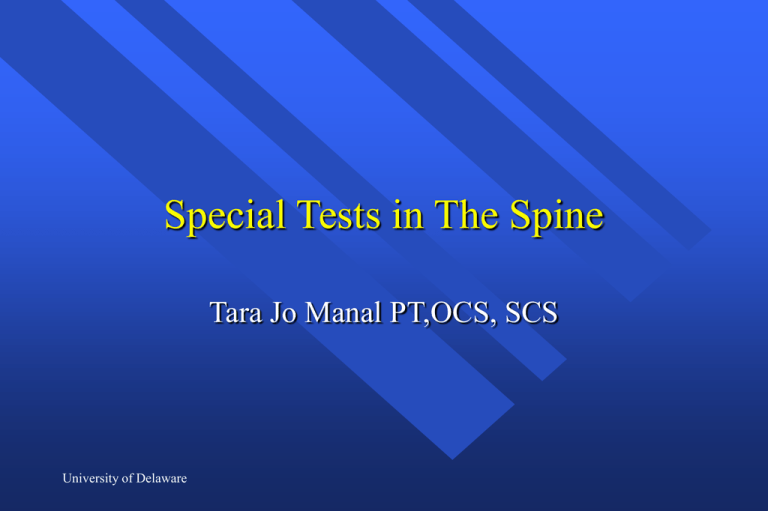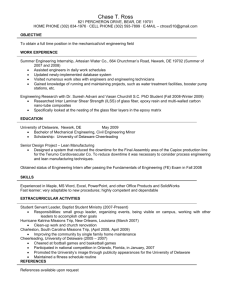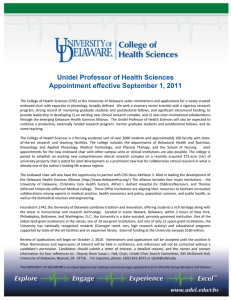Cervical Spine Evaluation and Treatment The Role of Manipulation
advertisement

Special Tests in The Spine Tara Jo Manal PT,OCS, SCS University of Delaware Vertebral Artery Test Combined Movements to stress test the cervical spine Symptoms: – – – – – Dizziness -Tinnitus Lightheadedness Nystagmus -Parathesia Dysarthria - Diplopia Dysphagia University of Delaware Vertebral Artery Preliminary Test Patient is sitting. Sustain cervical extension for 10 seconds. Sustain Rotation (L and R) 10 seconds IF POSITIVE STOP If the testing is negative progress to standard position. University of Delaware Vertebral Artery Standard Test Patient is supine. Sustain cervical extension for 10 seconds. Sustain Rotation (L and R) for 10 seconds Combine Extension with Rotation (L and R) for 10 seconds. Test the patient in the manipulation position IF POSITIVE STOP, do not manipulate University of Delaware Cervical Distraction Nerve Root Compression Radicular pain is decreased, test is positive University of Delaware Cervical Compression Test Pressure downward on head Test is positive if pain is evoked University of Delaware Spurling A Seated Neck Side bent to the ipisilateral side 7kg of overpressure applied Presence of pain, parasthesial or numbness University of Delaware Spurling B Seated Extension Sidebending and Rotation to the ipsilateral side 7kg of axial pressure is applied University of Delaware Sharp –Purser Test Neck in semi flexion Palm of one hand on forehead Index finger on Spinous process C2 Posterior force through forehead Posterior slide is + for AA instability University of Delaware Shoulder Abduction Sign Most common nerve root compression at C5-6 Decrease in symptoms is positive response University of Delaware Median Nerve Testing Shoulder Retraction and Depression Shoulder Extension External Rotation Elbow Extension Forearm Supination Wrist/Finger Extension Cervical SB and Rot Away University of Delaware Upper Limb Tension Testing A Scapular Depression Shoulder Abduction Shoulder ER Elbow Extension Forearm Sup Wrist and Finger Extension University of Delaware Radial Nerve Testing Proximal as for Median Shoulder Internal Rot Forearm Pronation Wrist Flexion Ulnar Deviation Finger Flexion University of Delaware Upper Limb Tension Testing B Supine in 30º Abd Scap Depression Shoulder IR Elbow Extension Wrist and Finger Flexion Opposite Cervical SB and Rot University of Delaware Ulnar Nerve Testing Shoulder Retraction Shld Ext and ER Elbow Flexion Forearm Supination Wrist Extension and Radial Deviation Finger Extension Cervical SB and Rot away University of Delaware T1 Nerve Root Stretch Abduct to 90º Flex pronated arms to 90º Flex elbows and place behind the neck Pain in scapular area is T1- Pain in Ulnar distribution is Ulnar University of Delaware Cervical Lateral Glides University of Delaware University of Delaware University of Delaware Intervention 3 Thrust Manipulations – 2 reps of each Seated Distraction University of Delaware Intervention Supine Upper Thoracic Manip University of Delaware Intervention Supine Middle Thoracic Manipulation University of Delaware Other Intervention Cervical ROM University of Delaware Upper Thoracic Manipulation CT junction Patient sits far back on table Stabilize shoulders Use their hands as fulcrum Distract upwards – Drop down University of Delaware Winters, et al., 1997 Manipulation to surrounding structures in patients with complaints originating from the shoulder girdle are more effective when the shoulder pain is not related to decreased ROM in the glenohumeral joint University of Delaware



